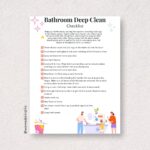
Creating a rigorous and functional household budget is both an art and a science. It requires attention to detail, an understanding of finances, and discipline to stick to the plan. Despite the challenges, the security and peace of mind that come with having strong financial planning are invaluable. Whether you're aiming to navigate through tough financial waters or plan for future investments, a solid budget is your roadmap to success. Keep reading to discover the contours of effective budgeting and how you can harness its power for your household.
Understanding the Basics of Household Budgeting

Understanding household budgeting is essential for financial well-being, as it ensures a balance between income and expenses. To begin, list all sources of income, including salaries and bonuses, while categorizing expenses into fixed and variable costs. Use past financial records to accurately assess spending habits and identify areas for adjustment.
Account for occasional expenses like annual insurance premiums or car maintenance to avoid unexpected financial strain. Don't forget to include unique expenses like the metro pcs pay phone bill in your budgeting efforts.
Setting Realistic Financial Goals and Priorities
Effective budgeting goes beyond simply tracking finances; it's about achieving financial objectives. To succeed, set realistic and time-bound goals like saving for a down payment, building an emergency fund, or paying off debt. Prioritize what matters most, whether it's education, travel, or retirement savings, to guide your spending decisions.
Combine short-term goals, like reducing debt through extra payments, with long-term aspirations to maintain momentum. Stay flexible and adjust your budget as life events necessitate, ensuring it remains relevant and effective over time.
Tracking Your Income and Expenses Effectively
Monitoring income and expenses is vital for financial health. Consistently recording transactions keeps you aware of your fiscal status and any potential issues. Use a method that suits your lifestyle, like manual entries, spreadsheets, or budgeting software. Regular review creates a financial feedback loop, refining budgeting skills over time.
Effective tracking involves anticipating variable expenses such as utility bills or vehicle maintenance. Historical data helps plan for fluctuations. Analyze expenses to identify areas for potential cutbacks, like dining out or subscription services. Adjust spending to align with financial goals.
Tips for Reducing Expenses and Increasing Savings

To bolster your financial health, it's crucial to trim non-essential spending. Evaluate luxuries you can cut back on and find cost-effective alternatives. For example, consider switching from cable to a cheaper streaming service and dining in more often. When unavoidable expenses arise, like home repairs, seek out the best deals. For instance, if you need heating repair Lake Zurich IL, compare quotes and check reviews for savings without compromising quality.
Implementing energy-efficient practices at home can also lead to significant savings on utility bills. Simple adjustments like sealing drafts and optimizing thermostat settings can make a difference. Consolidating debt to reduce interest payments can free up funds for savings. Redirect the money saved from cutting expenses into your savings or investment accounts. This intentional effort not only strengthens your financial position but also brings you closer to your goals. The satisfaction of watching your savings grow is invaluable.
Utilizing Budgeting Tools and Apps to Stay on Track
In today's digital era, there's an abundance of budgeting tools and apps designed to simplify and optimize financial management. These tools offer features like automated expense categorization, bill payment reminders, and real-time budget analysis.
By leveraging technology, users can achieve greater accuracy and efficiency in their budgeting process. Many apps sync data from multiple accounts, providing a comprehensive overview of finances. This holistic view enables informed decision-making and strategic financial planning.
One of the key advantages of budgeting apps is the ability to set alerts for approaching spending limits, helping users avoid overspending. Some apps offer personalized insights and tips to promote better financial habits.
Exploring various budgeting tools, many of which offer free trials, allows users to find the best fit for their needs. Once a tool is chosen, regular check-ins and adjustments ensure the budget aligns with lifestyle and financial goals.
Overall, crafting and sticking to a household budget may seem overwhelming, but the benefits of financial stability and peace of mind are significant. By budgeting thoughtfully and using available tools, you can take charge of your financial future, paving the path to a stable and prosperous life. Assess, adjust, and aim for your goals—achieving financial security is within your grasp.


















Leave a Reply